 BOBBY STEWART
.
August 23, 2023
.
F100 Builders
BOBBY STEWART
.
August 23, 2023
.
F100 Builders
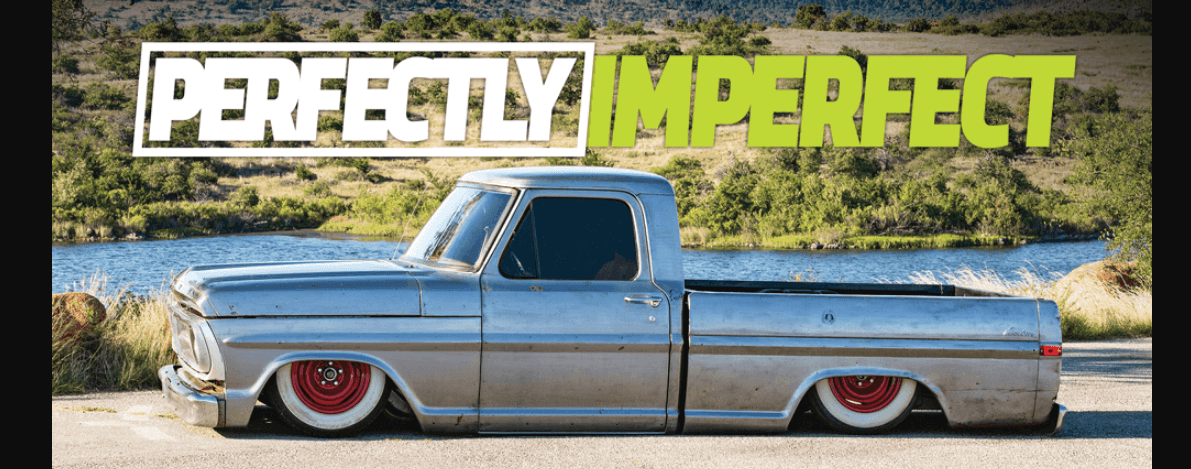
As a teen, Jeremy Pendergraft from Hollis, Oklahoma, used to flip through the pages of his favorite truck magazines, dreaming that he would someday build his own. “When I was growing up, I would see trucks that were perfect, and it felt unreachable,” he recalled.
Fast-forward to present day. Times have changed, attitudes have changed, and Jeremy was sitting on a custom gold mine of family-owned trucks to work with. His wife ultimately provided the push he that needed to turn an old work truck into the low, mean badass he wanted without emptying his wallet in the process.
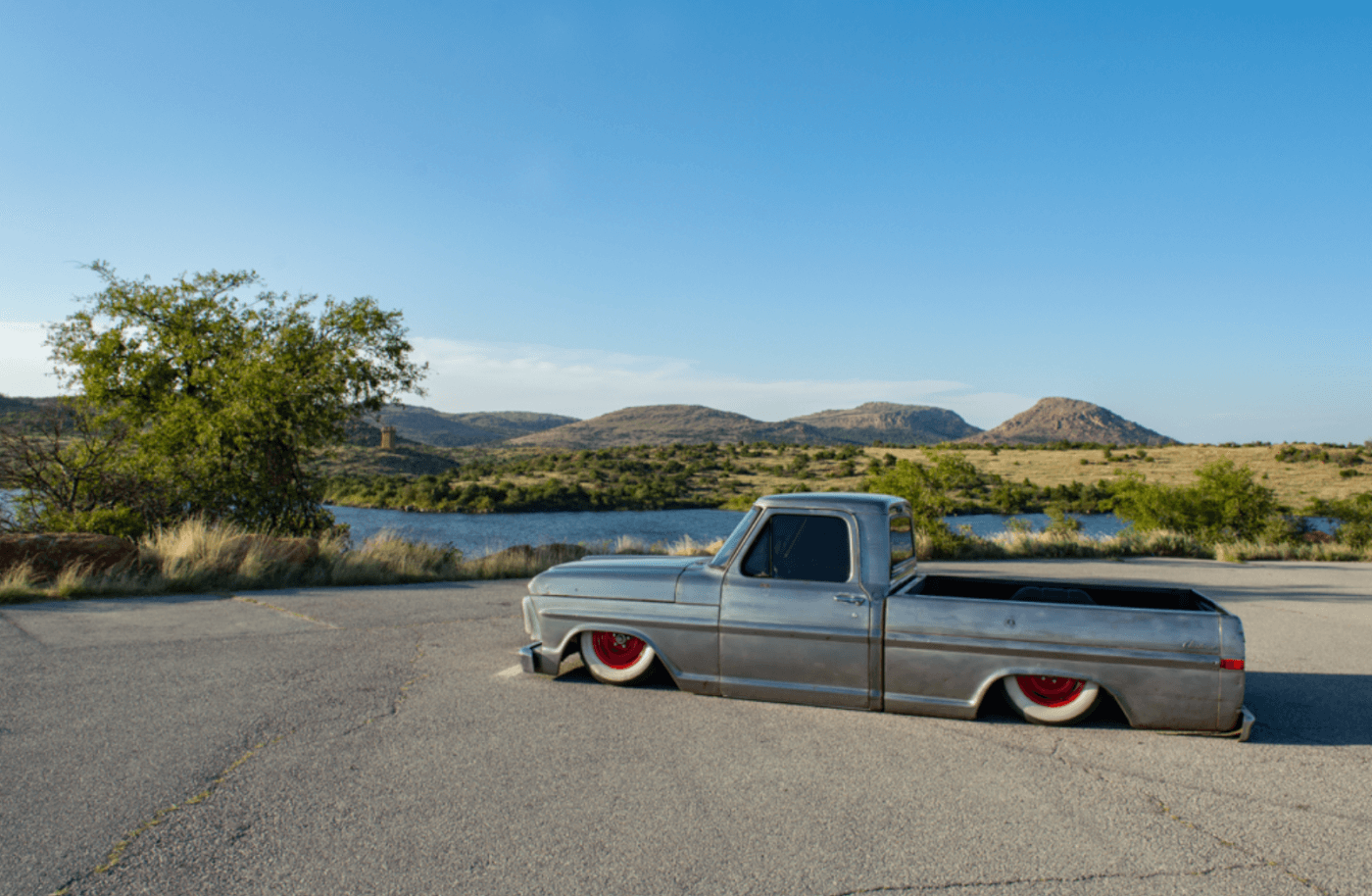
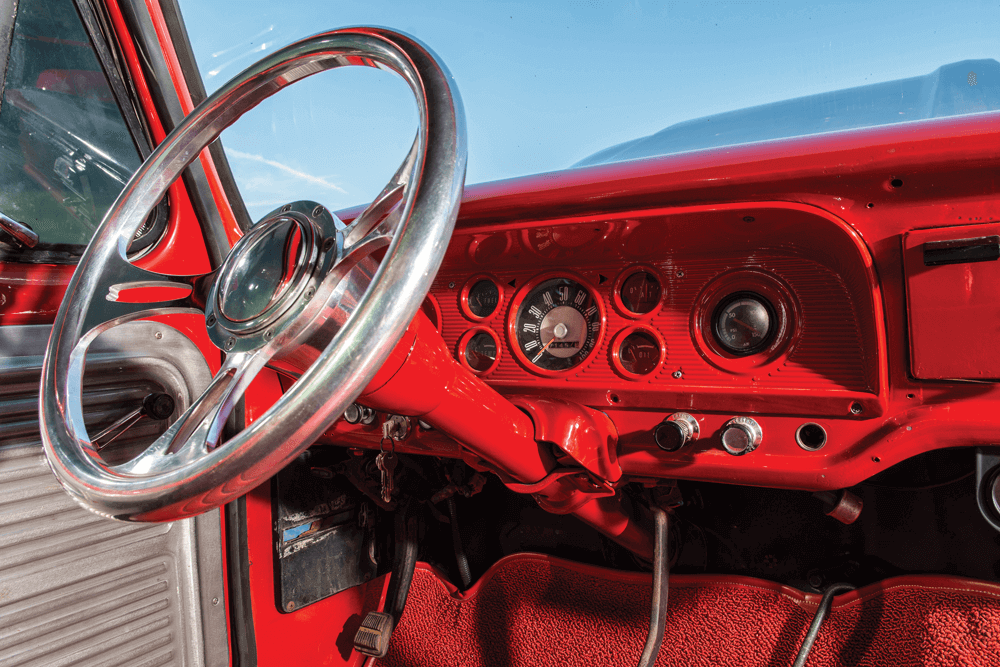
Jeremy is self-admittedly known as a Ford guy. He is the only Ford guy in his group, so it made sense that he wanted to build this 1971 Ford F100.
“I was always told you can’t make a Ford lay out,” he says. “I had to prove them wrong.”
As luck would have it, there was an old ¾-ton sitting outside not being used.
“The truck had been in my family for a while,” he says. “It was a ¾-ton with a camper. It was parted out and sitting in a field.”
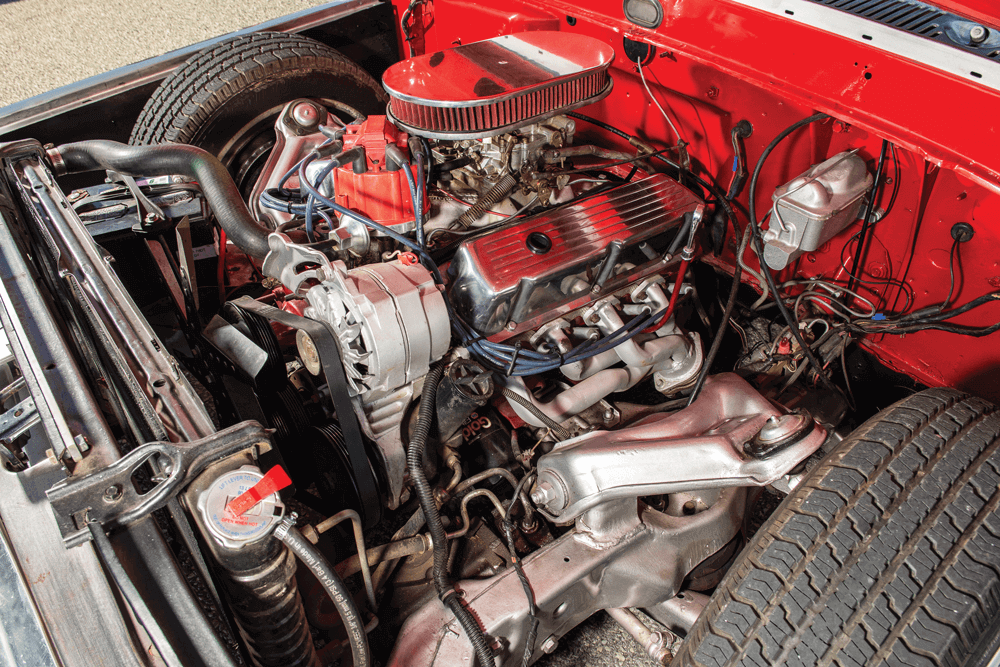
However, to make a complete truck, he was going to need a new bed. While he had access to several old trucks, he did not have a bed he could use, so he looked at outside sources. A local farmer had a step-side bed for sale, but Jeremy saw something better: a bed that had been converted into a trailer. The 1971 short bed had been converted to into a deer corn trailer and the farmer had been using it for years, but it was exactly what Jeremy wanted, so he offered to buy it on the spot.
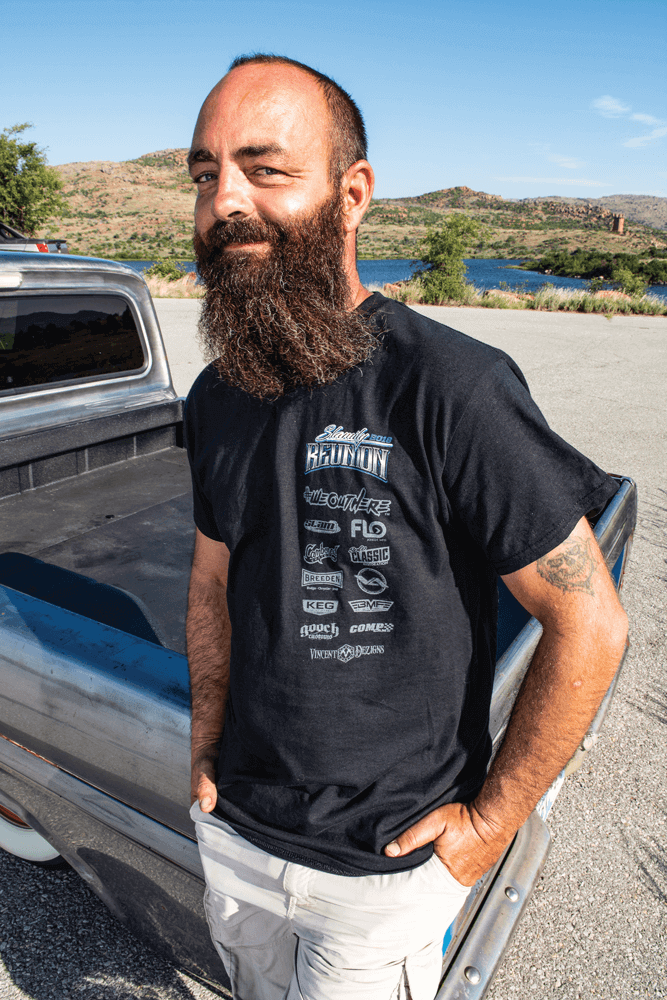
“That old man thought I was crazier than hell,” Jeremy laughingly joked.
While the bed was a good find, it also needed a lot of time and attention. Jeremy’s wife bought him a stud puller and he handled the task of straightening the body himself. The bed floor was completely rusted out, but Jeremy had planned to build a new, raised floor anyway. To complete that, he employed his wife and son, and together they raised the bed floor and fenders, using a set from an old 1966 Ford he had rolled in an accident as a teenager.
“I think that’s one of the coolest things about the whole truck,” Jeremy explains. “My entire family was there. Everybody had a say so in the process.”
The bare metal skin of Jeremy’s Ford is an instant eye catcher. Since the Ford was built using multiple trucks, the idea was to sand it down to metal, clear coat it to preserve it and then eventually paint it. To complete that, he also turned to his family for help.
“We took it down to the bare metal because we were going to try to paint it,” Jeremy says. “The truck started getting so much attention as bare metal, we loved it and decided to keep it.”
What can easily be overlooked due to the simplicity of Jeremy’s Ford is the solid frame work that lies hidden beneath the shiny body.
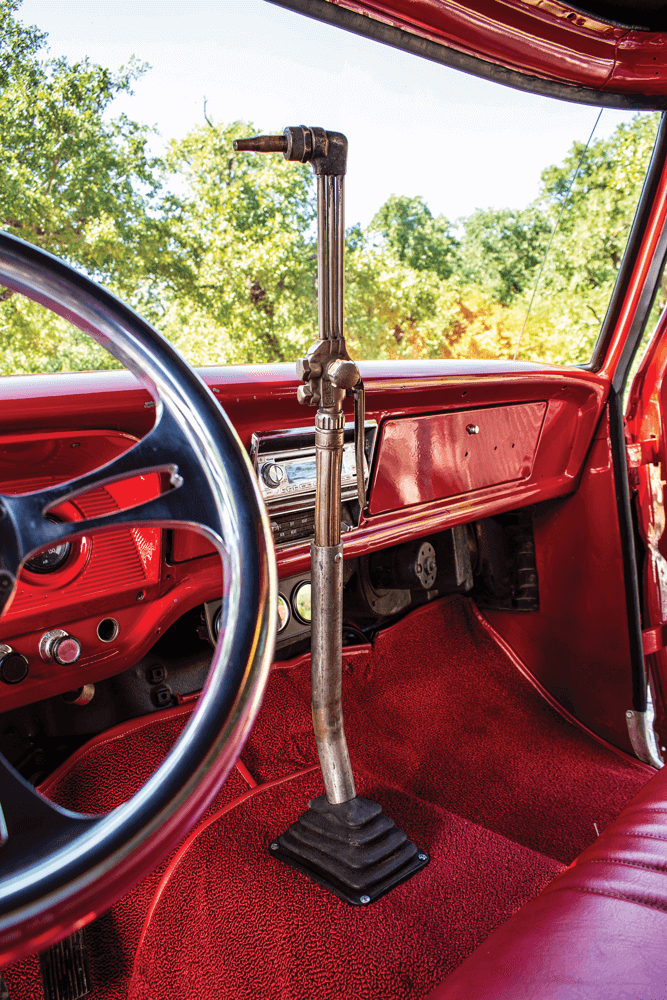
“The truck is not body dropped; the frame is custom,” he says. “I wanted it low. I wanted it stupid low and I feel like I achieved it.”
The Ford’s 2×4 rectangular frame features the entire front suspension from a donor 1985 Lincoln Town Car, which was refreshed and a custom 2-link in the rear fabricated by the owner. Jeremy painted the frame metallic silver and installed Airmaxx airbags and toggle switches lift his truck from “stupid low” to ride quite effectively.
For power, Jeremy originally planned to use a Ford 390. As it turns out, the 390 was too tall and would have stuck out of the hood by nearly 8 inches. Jeremy wanted a flat, stock hood so he turned to the Ford 302 and transmission from the same donor 1985 Lincoln Town Car. The Ford 302 has been rebuilt and features an Edelbrock Performer intake manifold, carburetor and headers that Jeremy picked up from a swap meet. The exhaust flows through Flowmaster mufflers.
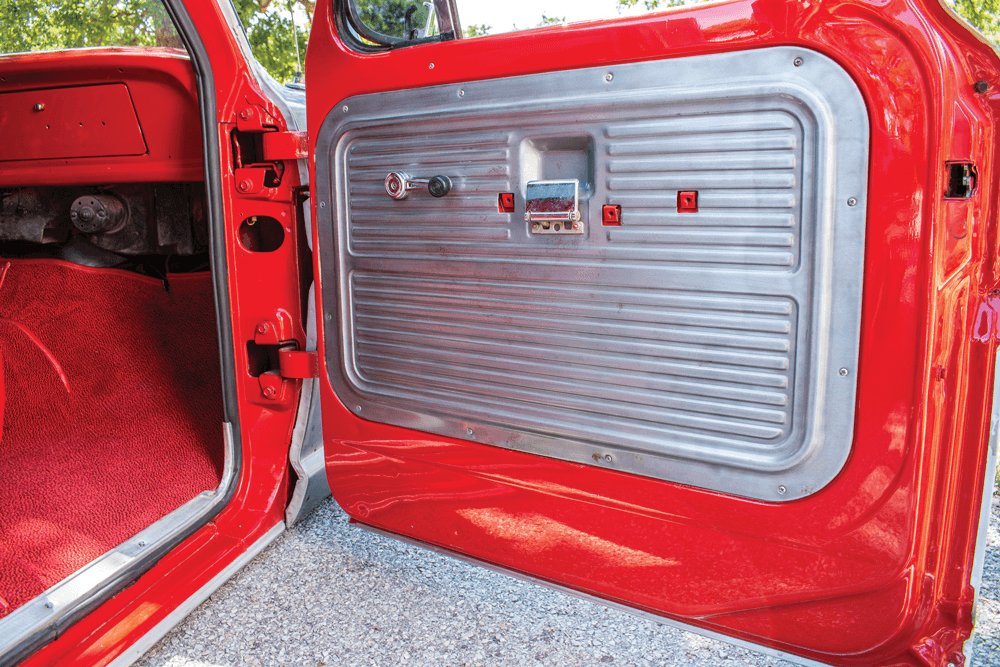
After being unable to find a set of wheels that he liked, Jeremy turned back to the donor 1985 Lincoln Town Car. He simply painted the wheels from the Town Car red and has used them since.
“I’ve tried changing them since, and it doesn’t look right,” he says. “I even tried some Torque Thrust wheels on it and didn’t like it.”
The original truck had a padded dash and a lot of wood grain, and quite frankly, Jeremy hated it. The interior now consists of the instrument panel and doors from a 2 ½ ton wheat truck and a bench seat that was gifted to him from a 1994 Chevy truck. M&R Upholstery in Altus, Oklahoma, recovered the seat in red vinyl. The custom shifter is actually an old antique torch that he picked up from his dad’s collection and is easily the attention piece of the Ford’s interior.
Since completion, Jeremy’s Ford has been gaining a lot of attention from others and at shows, much to the surprise of the owner.
“I had no intentions of it ever being a show truck,” he says. “It was definitely built with junkyard parts for sure.”
With a total cost of around $3,000, Jeremy’s Ford is the definition of budget build.
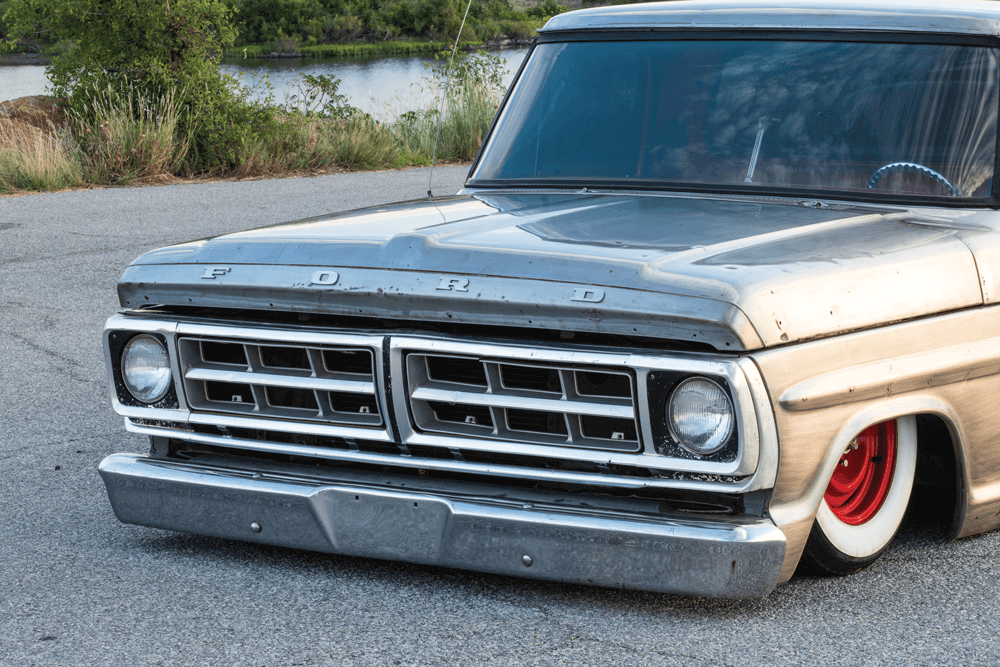
Jeremy wanted to say thanks to those who helped him along the way, including his wife Kaesi and son Jaydon.
“Everybody kind of dreams of building things with your dad,” he says. “I was able to do that with my son, so that was pretty cool.”
He would also like to thank his dad, Brian Gollihare from Midway Motors, and Mark Whiteskunk and Kyle Davis’ help with the airbag system.
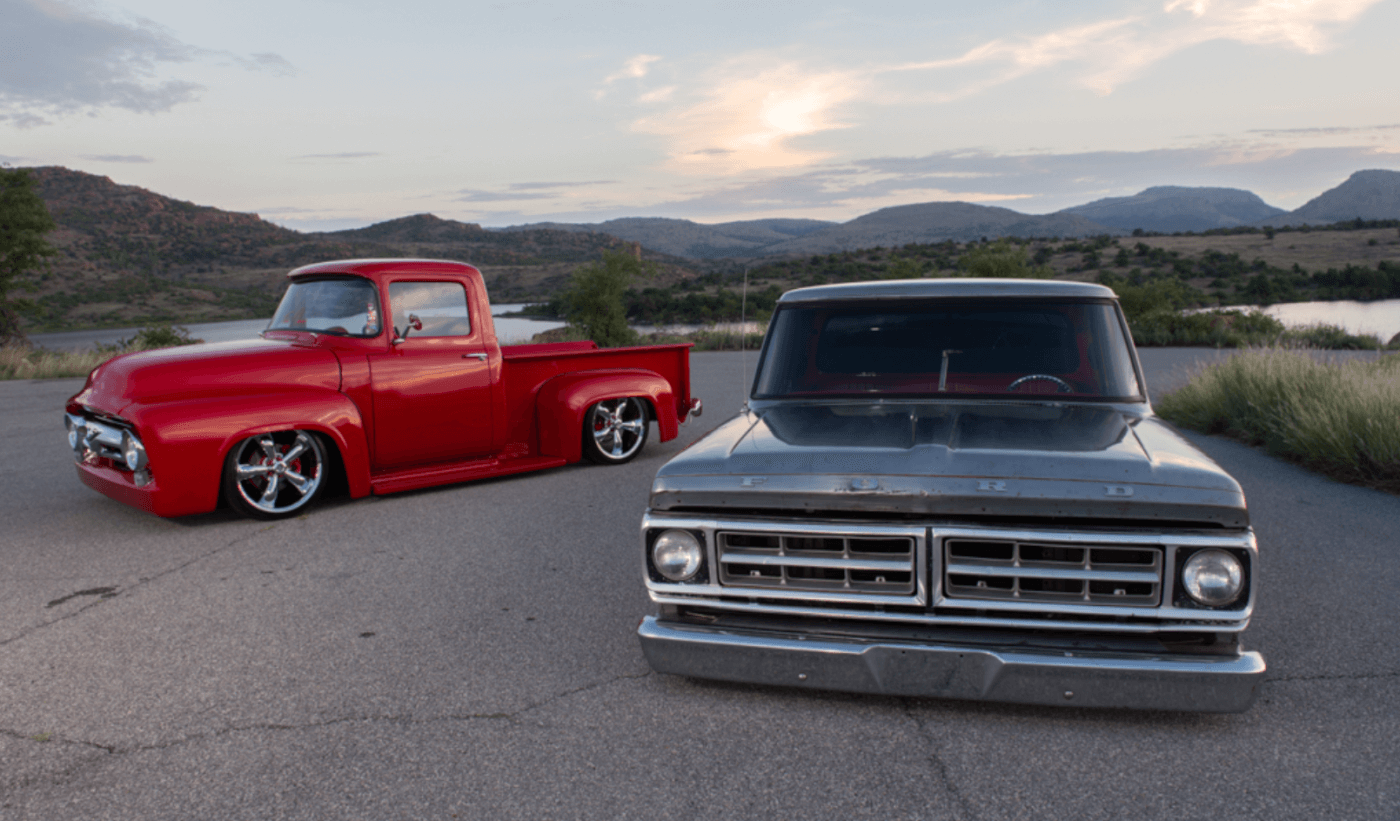
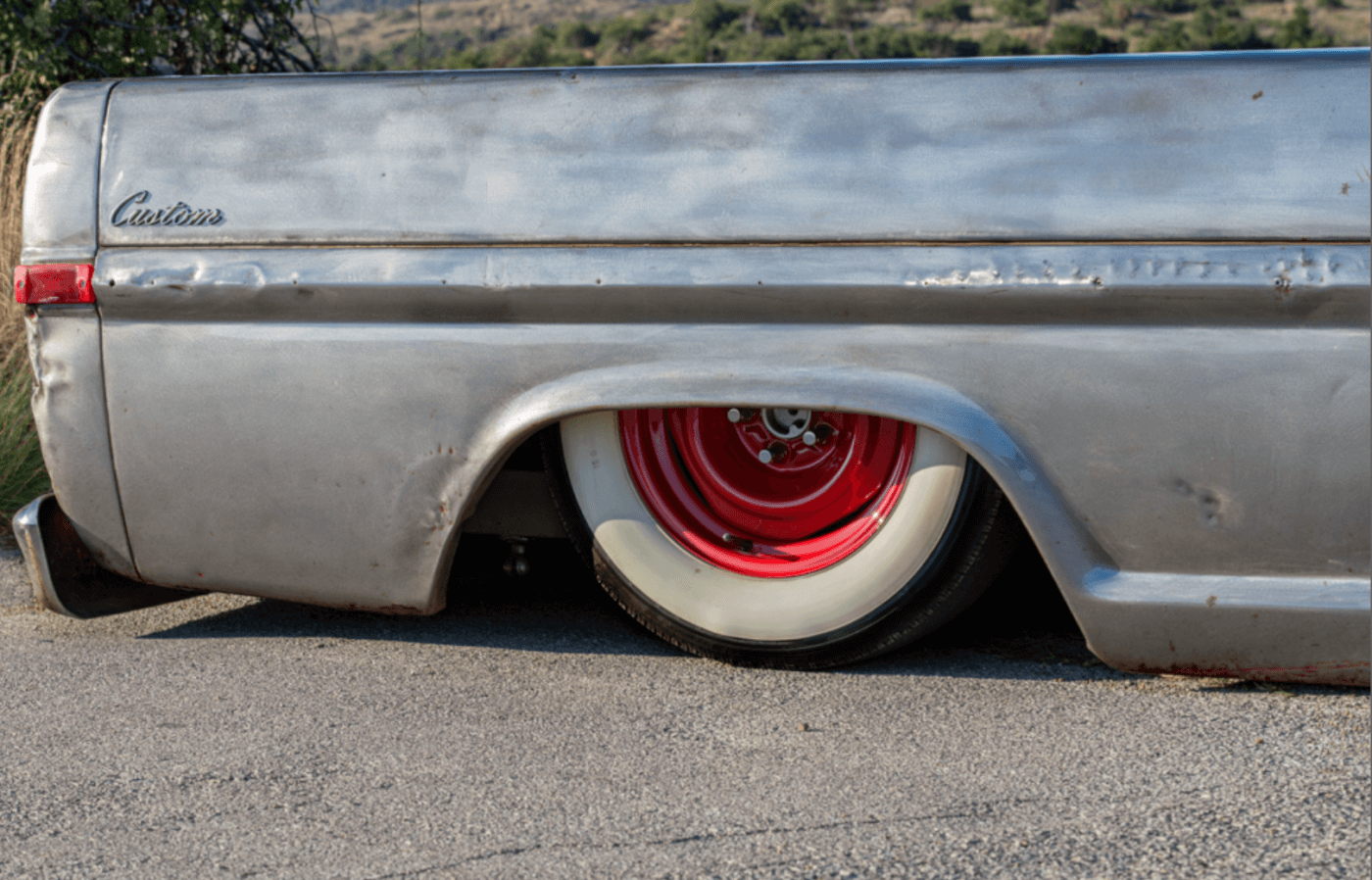
What recognition did the 1971 Ford F-100 receive after its restoration?
After its meticulous restoration, the 1971 Ford F-100 earned the distinguished honor of being named F-100 of the Year at the recent SuperNationals event in Knoxville. This recognition came after three challenging years of dedicated work on the truck, underscoring the exceptional quality and effort put into its restoration.
How long did the restoration and upgrade process take for the 1971 Ford F-100?
The restoration and upgrade process for the 1971 Ford F-100 took significantly longer than initially expected. The goal was to keep the truck mostly intact and complete the paint job in around three weeks. However, what was anticipated as a quick project eventually extended to nearly three years.
What safety features were added to the 1971 Ford F-100 during the rebuild?
The 1971 Ford F-100 underwent a meticulous rebuild, incorporating several modern safety enhancements.
Here’s a detailed list of the added features:
With these upgrades, drivers can enjoy a classic truck merged with the safety standards of modern vehicles.
What audio system components were installed in the 1971 Ford F-100?
The 1971 Ford F-100 was equipped with a sophisticated audio system. The setup included a state-of-the-art head unit and a series of high-quality speakers designed to deliver an immersive audio experience.
The head unit served as the central control for the audio system, featuring numerous functions to enhance sound quality and user convenience.
This combination ensured a balanced and powerful sound distribution throughout the vehicle.
What condition was the 1971 Ford F-100 in when it was purchased?
“The truck had been in my family for a while,” he says. “It was a ¾-ton with a camper. It was parted out and sitting in a field.”
He goes on to describe its condition in more detail. “It had a six-cylinder engine and a three-on-the-tree transmission. The paint job was about 10 years old and was hiding a bunch of bad bodywork.”
The combination of being partly disassembled and having hidden body damage made it clear that restoring this truck would be a significant project. But for him, it was worth the effort to bring a family heirloom back to life.
What custom fabrications were made for the 1971 Ford F-100?
“The truck is not body dropped; the frame is custom,” he says. “I wanted it low. I wanted it stupid low and I feel like I achieved it.”
Last-minute additions were the fabrication of the core support cover and fan shroud; the air cleaner that was fabbed out of another hood; and some 16-gauge sheet metal bent into a recessed bed cover–which gives it a nice finished look while providing storage underneath.
“The Ford’s 2×4 rectangular frame features the entire front suspension from a donor 1985 Lincoln Town Car, which was refreshed and a custom 2-link in the rear fabricated by the owner.”
Jeremy painted the frame metallic silver and installed Airmaxx airbags and toggle switches to lift his truck from ‘stupid low’ to ride quite effectively.
The interior now consists of the instrument panel and doors from a 2 ½ ton wheat truck and a bench seat that was gifted to him from a 1994 Chevy truck.
The custom shifter is actually an old antique torch that he picked up from his dad’s collection and is easily the attention piece of the Ford’s interior.
What are the specific engine specifications of the 1971 Ford F-100?
The Ford 302 has been rebuilt and features an Edelbrock Performer intake manifold, carburetor, and headers that Jeremy picked up from a swap meet. The exhaust flows through Flowmaster mufflers.
For those seeking a deeper dive into the specifics, here’s a detailed breakdown:
This meticulous attention to detail ensures that every component works harmoniously, enhancing both performance and reliability. The combination of modern and classic parts not only boosts power but also adds a unique character to the engine.
Who built the engine?**
The engine was built by Dale Etheredge Performance in Covington, GA.
Are there any additional components or modifications?**
Yes, it includes an ’85 Crown Vic dual serpentine accessory drive with custom aluminum pulley covers by Ed Owens.
What type of exhaust and mufflers are used?**
The exhaust system includes 2 1/4″ pipes with Flowmaster mufflers.
What is the engine displacement?**
The engine has a displacement of 302 cubic inches.
What is the year and make of the engine?**
The engine is from a 1978 Ford.
What changes were made to the suspension and handling of the 1971 Ford F-100?
“The truck is not body dropped; the frame is custom,” he says. “I wanted it low. I wanted it stupid low and I feel like I achieved it.”
The Ford’s 2×4 rectangular frame features the entire front suspension from a donor 1985 Lincoln Town Car, which was refreshed, and a custom 2-link in the rear fabricated by the owner. Jeremy painted the frame metallic silver and installed Airmaxx airbags and toggle switches to lift his truck from ‘stupid low’ to ride quite effectively.
In addition to these customizations, the truck underwent numerous other modifications to enhance its suspension and handling.
These comprehensive modifications ensure that the truck not only looks stunning but also performs exceptionally well on the road.
What steps were taken to improve the bodywork and paint of the 1971 Ford F-100?
“We took it down to the bare metal because we were going to try to paint it,” Jeremy says. “The truck started getting so much attention as bare metal, we loved it and decided to keep it.”
Initially, the goal was to perform a paint job without extensive disassembly. However, it quickly became clear that to achieve a quality finish, everything needed to be stripped to bare metal. The truck was fully disassembled, a process that extended the project timeline from an estimated three weeks to nearly three years.
During this period, significant fabricating, welding, and grinding were necessary. Midway through, the decision was made to pie-cut the hood. The bed underwent media-blasting, and all seams were welded to prepare for the finish bodywork. Recognizing that additional help was needed to complete the project in a timely manner, the bed and hood were sent to a specialized custom shop for final touches.
Back home, the painting process began with the cab, followed by the doors, bed, tailgate, and finally, the front sheetmetal. Despite the lengthy and intricate process, the end result was a truck that not only retained its unique bare metal look but also boasted a meticulously detailed bodywork foundation.
What paint type and color were used on the 1971 Ford F-100?
“We took it down to the bare metal because we were going to try to paint it,” Jeremy says. “The truck started getting so much attention as bare metal, we loved it and decided to keep it.”
However, for those curious about the original plan, the intended paint type was PPG Concept in a striking dark green. This choice was meant to give the 1971 Ford F-100 a unique and eye-catching finish.
By embracing the raw, unpainted look, Jeremy’s decision highlighted the truck’s rugged charm while also deviating from the conventional. The bare metal garnered unexpected admiration, proving that sometimes, simplicity speaks volumes.
What is the color of the paint used on the 1971 Ford F-100?
The color of the paint is dark green.
What is the paint type used on the 1971 Ford F-100?
The paint type used is PPG Concept.
What are the specific interior specifications of the 1971 Ford F-100?
The original truck had a padded dash and a lot of wood grain, and quite frankly, Jeremy hated it. The interior now consists of the instrument panel and doors from a 2 ½ ton wheat truck and a bench seat that was gifted to him from a 1994 Chevy truck. M&R Upholstery in Altus, Oklahoma, recovered the seat in red vinyl. The custom shifter is actually an old antique torch that he picked up from his dad’s collection and is easily the attention piece of the Ford’s interior.
To get a closer look at the interior specifications, here’s a detailed breakdown:
Other notable mentions include the interior upholstery crafted by Gene Payne from McDonough, GA, alongside some personal touches added by Jeremy himself.
This blend of meticulous craftsmanship and personal touches transforms the 1971 Ford F-100 into a unique masterpiece, both inside and out.
What are the specific transmission specifications of the 1971 Ford F-100?
“For power, Jeremy originally planned to use a Ford 390. As it turns out, the 390 was too tall and would have stuck out of the hood by nearly 8 inches. Jeremy wanted a flat, stock hood so he turned to the Ford 302 and transmission from the same donor 1985 Lincoln Town Car.
This choice ensured not only a cleaner look but also a reliable and well-matched powertrain. The Ford C4 transmission, custom-modified by Porter Transmission, provided the perfect blend of durability and performance for Jeremy’s needs. With the shifter mounted on the column, the interior retained a classic feel, aligning with Jeremy’s vision for the truck.”
What are the specific chassis specifications of the 1971 Ford F-100?
“The truck is not body dropped; the frame is custom,” he says. “I wanted it low. I wanted it stupid low and I feel like I achieved it.”
“The Ford’s 2×4 rectangular frame features the entire front suspension from a donor 1985 Lincoln Town Car, which was refreshed and a custom 2-link in the rear fabricated by the owner. Jeremy painted the frame metallic silver and installed Airmaxx airbags and toggle switches to lift his truck from ‘stupid low’ to ride quite effectively.”
To get into the specifics, here’s a comprehensive breakdown of the chassis details:
Component Specification Frame Custom, 2×4 rectangular Rearend / Ratio Ford 9″ / 3.25:1 Rear Suspension De-arched leaves, 2″ drop shackles, 3″ drop hangers Rear Brakes Stock drum brakes Front Suspension 3″ drop I-beams, 2″ drop springs, refreshed from ’85 Lincoln Town Car Front Brakes 12″ disc from ’78 F-150 Steering BoxPower from ’78 F-150 Front Wheel Make, SizeAmerican Racing Torque Thrust II, 16×7 Rear Wheel Make, SizeAmerican Racing Torque Thrust II, 17×8 Front Tire Make, Size Goodyear Eagle GT II, P225/60R16 Rear Tire Make, Size Goodyear Eagle GT II, P275/60R17 Gas Tank Universal by Tanks, under bed Jeremy’s meticulous attention to detail extends beyond just the frame modifications. The combination of the custom suspension and carefully selected wheels and tires ensure that this 1971 Ford F-100 not only sits low but also rides smoothly and handles well. The use of components from classic models like the ’78 F-150 and ’85 Lincoln Town Car showcases a blend of retrofitting and modern ingenuity. This balance of bespoke craftsmanship and practical performance makes Jeremy’s truck a standout example of custom automotive engineering.
Share Link